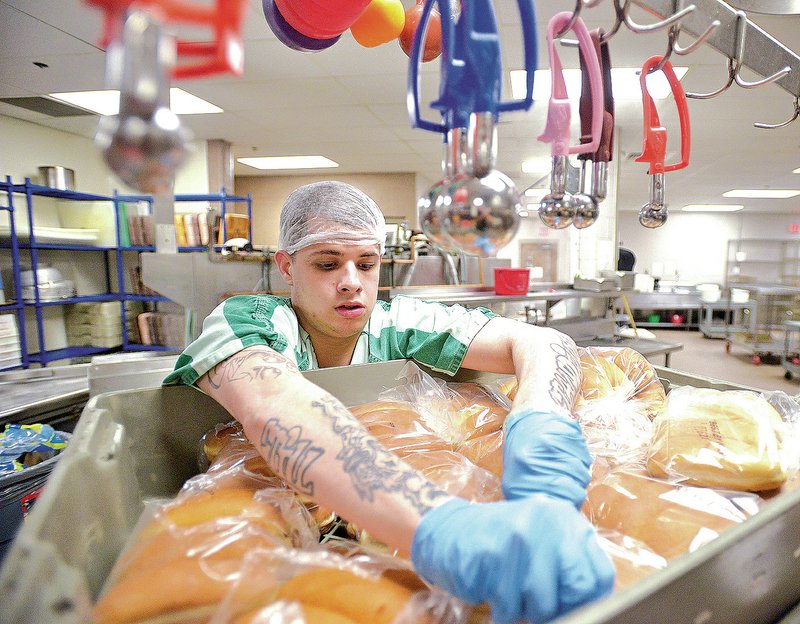BENTONVILLE -- Years of sandwich fare at the Benton County Jail changed overnight last month with the addition of hot meals.
Last week's menu had burgers and fries one day and sloppy Joes another, said Jeremy Guyll, Benton County Jail administrator.
Web Watch
http://www.dfa.arka…">View Arkansas’ Criminal Detention Facility Standards
Chili mac, spaghetti, nachos with Spanish rice and side salads have replaced a lunchmeat sandwich for one meal and cubed lunchmeat mixed with mayonnaise for the next.
"The food is good," Guyll said.
Two meals are served hot and breakfast is served cold, rather than three cold meals a day, Guyll said.
The change was recommended in Arkansas' revised criminal detention facility standards Jan. 5.
Benton County jail officials anticipated the change but had been working on a plan for just one hot meal a day. A contract was approved in December, and Guyll got one hot meal a day menu Jan. 30. It took another 30 days to get dietitians to again revise the menu, Guyll said.
The jail started serving two hot meals March 19, Guyll said.
The new jail standards were under review in monthly committee meetings of administrators for nearly a year before they went for a public hearing Oct. 30.
Maj. Clayton Edwards, White County Jail administrator, was head of the Arkansas Jail Administration Association during the review. His term ended in January.
The former jail standards were established in 1988 and those were the rules administrators were held to on inspection visits, Edwards said. The rules were outdated -- sprinkler systems weren't even mentioned -- and jail administrators wanted them revised, he said.
Other changes in the rules mandated more training for jailers -- including requiring them to be trained in CPR -- and requiring a psychological evaluation before hiring.
While most changes weren't new to Arkansas jails, the state lacked uniformity, especially in some smaller facilities, Edwards said.
Standards establish rules for the jailers, and documenting they follow those rules protects a detention facility from civil litigation from inmates, he said.
Not every detention facility will do things the same, Edwards said.
"We wanted everybody to be on that same sheet of music," he said.
A MEAL'S COMFORT
Most of the public comment during the standards review was about food, said Danny Hickman, Carroll County Detention Center warden. Hickman served as criminal detention facilities coordinator for most of the review process.
Roger Joslin, vicar at All Saints Episcopal Church in Bentonville, has lobbied for more than seven years and two administrations in Benton County for hot meals instead of lunchmeat on white bread.
"Whatever they had, it was always cold and not the least bit nutritious," Joslin said.
Hot meals are standard across other correctional facilities, he said. He drove to Little Rock with a couple of congregation members for the meeting and conducted a letter-writing campaign to get the change finalized. He tried and failed to hammer out an agreement where parishioners could provide an occasional hot meal to Benton County inmates. The incarceration rate is a problem too big for his church to handle, but they could lobby for change at the local level, he said.
Too many young people are locked away from family and friends and that's punishment enough, he said.
"The comfort of a hot meal can go a long way to improving a person's well being," Joslin said.
Hickman, the Carroll County administrator, said feeding inmates hot meals seems to keep them calmer and that makes less work for the staff.
Carroll County serves a hot breakfast and dinner. The evening meal might be beans and cornbread three nights a week, but sometimes there's three hot meals a day. Cold food has to be cooked and cooled so the cost is about the same, he said.
Washington County has served two hot meals a day for years, said Kelly Cantrell, spokeswoman for the Washington County Sheriff's Office.
'NEVER ABOUT PRICE'
Jail inspectors recommended during a 2014 inspection Benton County begin serving hot food, Guyll said. He's hoping for a boost in inmates' morale. Fights damage equipment and incur medical costs.
Some inmates are in jail long term, waiting to be transferred to prison. Some of those have been in the jail for a year, Guyll said.
About 40 or 50 of the long-term inmates were on special diets for religious or health reasons. That has dropped to nearly zero, saving costs, Guyll said. The price for hot meals is the same -- 89 cents per meal -- as it was before.
Benton County contracts with CBM Correctional Food Service and the company supplied all the equipment needed for the change, he said. The only cost to the county so far has been $4,216 for trays so contractors can prep breakfast meals the night before during dinner service. The money came out of the kitchen budget, Guyll said.
It's unclear if Benton County was the last detention facility in the state to begin serving some meals hot. It's among the last, several people said.
Benton County officials have sought for the jail to project an image the county isn't soft on crime or offenders.
"It's never been about the price," Guyll said.
Benton County Jail has no televisions but trusties in Washington County have television access. All pods have television in Carroll County, but only two channels, Hickman said.
Benton County added a commissary in 2012. It's an incentive for inmates to have the privilege of buying items in the commissary. The new menu will not infringe on commissary, Guyll said. Inmates will still buy coffee, pillows and candy bars.
Detention centers aren't there to make those jailed miserable, nor are they posh resorts, said Edwards, the White County administrator.
"It's about carrying out what the court has ordered," Edwards said.
NW News on 04/06/2015

